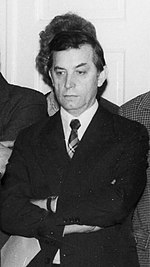Marian Odon Orzechowski (24 October 1931 – 29 June 2020) was a Polish politician and a former member of the Polish Communist Party. He served as foreign minister of the People's Republic of Poland from 1985 to 1988.
Marian Orzechowski | |
|---|---|
 | |
| Minister of Foreign Affairs | |
| In office 12 November 1985 – 17 June 1988 | |
| Prime Minister | Zbigniew Messner |
| Preceded by | Stefan Olszowski |
| Succeeded by | Tadeusz Olechowski |
| Personal details | |
| Born | October 24, 1931 Radom, Poland |
| Died | 29 June 2020 (aged 88) Wroclaw, Poland |
| Resting place | Wroclaw |
| Political party | Polish United Workers' Party |
| Alma mater | Leningrad University University of Wrocław |
Early life and education
editOrzechowski was born in Radom on 24 October 1931.[1][2] He received a degree in history from the University of Leningrad in Soviet Union.[3][4] In 1960, he received PhD from the University of Wrocław.[4]
Career
editOrzechowski was a senior politician of the Polish United Workers' Party.[5] He became a member of the central committee of the party in 1966.[3] He served in a variety of party posts and was appointed a central committee secretary.[3] He also headed the party's academy of social sciences.[6] In addition, he became a lecturer of history and political science at the University of Wrocław in 1966.[4] From 1971 to 1975 he served as the rector of the university.[4] He was the chief ideologist of the party, being ideology secretary to which he was elected at the fifth plenum on 27–28 October 1981.[7][8] From 1984 to 1986 he was the rector of the Academy of Social Sciences.[9]
He was appointed foreign minister on 12 November 1985 to the cabinet led by the then prime minister Zbigniew Messner.[2][6][10][11] He succeeded Stefan Olszowski in the post.[12] In addition, Orzechowski headed the PRON's national council, that was formed by the Polish authorities to develop a close interaction with the church, during that time.[13] He became a member of the politburo in June 1988 while retaining his post as foreign minister.[3] His term as foreign minister ended on 17 June 1988 and he was replaced by Tadeusz Olechowski in the post.[2] From 1988 to 1989 he served as the head of the Communist parliament delegation.[14][15] In July 1989 Orzechowski lost his position as executive ideology secretary of the party's central committee when Wojciech Jaruzelski resigned from the leadership of the party.[16][17] However, his membership at the central committee of the party continued for a while.[17]
Views and activities
editDuring his term as foreign minister, Orzechowski stated "historians who were members of the party were particularly inspected by the censors since they were to represent it."[18] In 1986 he was able to persuade the Soviet authorities to appoint Wlodzimierz Natorf, a controversial figure, as the Polish ambassador to Moscow.[19] Orzechowski participated in round table talks between the ruling party and opposition figures that lasted from 6 February to 4 April 1989.[9]
Work
editOrzechowski is the author of a book about political conditions in Poland and Polish foreign relations from 1989 to 1994.[15]
References
edit- ^ Contemporary Poland. Polska Agencja Interpress. 1986. p. 101.
- ^ a b c "Polish ministries". Rulers. Retrieved 13 June 2013.
- ^ a b c d John Tagliabue (16 June 1988). "Polish Communists Realign the Party Leadership". New York Times. Retrieved 13 June 2013.
- ^ a b c d "Prof. Dr. Marian Orzechowski". DPSK. Retrieved 16 June 2013.
- ^ Szayna, Thomas S. (April 1990). "Polish Foreign Policy under a Non-Communist Government: Prospects and Problems". Rand National Defense Research Institute. Archived from the original on 14 July 2013.
- ^ a b "Poland's new premier names cabinet; foreign minister out". Bangor Daily News. Warsaw. AP. 13 November 1985. Retrieved 13 June 2013.
- ^ John Tagliabue (29 July 1989). "Poland's Communist Party Debates Its Future". New York Times. Retrieved 13 June 2013.
- ^ Mark Kramer. "Soviet deliberations during the Polish crisis, 1980 - 1981" (PDF). Cold War International History Project. Special Working Papers (1): 150. Archived from the original (PDF) on 5 August 2012. Retrieved 14 July 2013.
- ^ a b Michael D. Kennedy (2002). "Negotiating revolution in Poland" (PDF). NCEEER. Retrieved 14 July 2013.
- ^ "New leadership team shifts focus to economy" (PDF). CIA. 10 December 1985. Retrieved 13 June 2013.
- ^ Gregory F. Domber (2008). Supporting the Revolution: America, Democracy, and the End of the Cold War in Poland, 1981--1989. p. 272. ISBN 978-0-549-38516-5. Retrieved 13 June 2013. Revised and incorporated in Gregory F. Domber (2014). Empowering Revolution: America, Poland, and the End of the Cold War. The New Cold War History. University of North Carolina Press books. ISBN 978-1469618517.
- ^ "Poland Shuffles Posts as Power Struggle Starts". Orlando Sentinel. Warsaw. 13 November 1985. Retrieved 13 June 2013.
- ^ Arthur R. Rachwald (1990). In Search of Poland: The Superpowers' Response to Solidarity, 1980-1989. Hoover Press. p. 114. ISBN 978-0-8179-8963-7. Retrieved 13 June 2013.
- ^ "Polish Parliament Approves New Cabinet". The Harvard Crimson. 13 September 1989. Retrieved 13 June 2013.
- ^ a b "Overview of the Marian Orzechowski writings" (PDF). Hoover Institution Archives. Retrieved 14 July 2013.
- ^ Butturini, Paula (30 July 1989). "Solidarity Foe Is New Polish Party Chief". Chicago Tribune. Warsaw. Retrieved 14 July 2013.
- ^ a b "Polish communists pick hard-liner to lead party". Deseret News. 30 July 1989. Archived from the original on 4 February 2014. Retrieved 14 July 2013.
- ^ Strządała, Gaweł. "Censorship in the People's Republic of Poland" (PDF). Folklore. Retrieved 13 June 2013.
- ^ Gillette, Robert (4 January 1986). "Poland Names New Ambassador in a Move to Better Its Kremlin Ties". Los Angeles Times. Warsaw. Retrieved 14 July 2013.